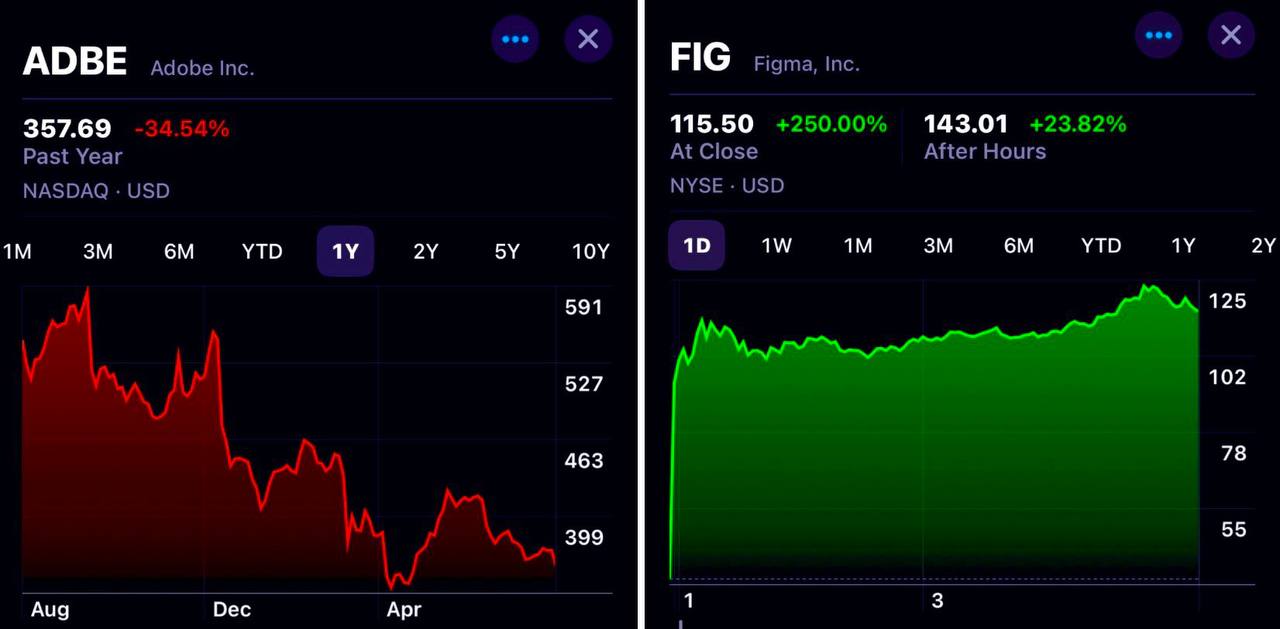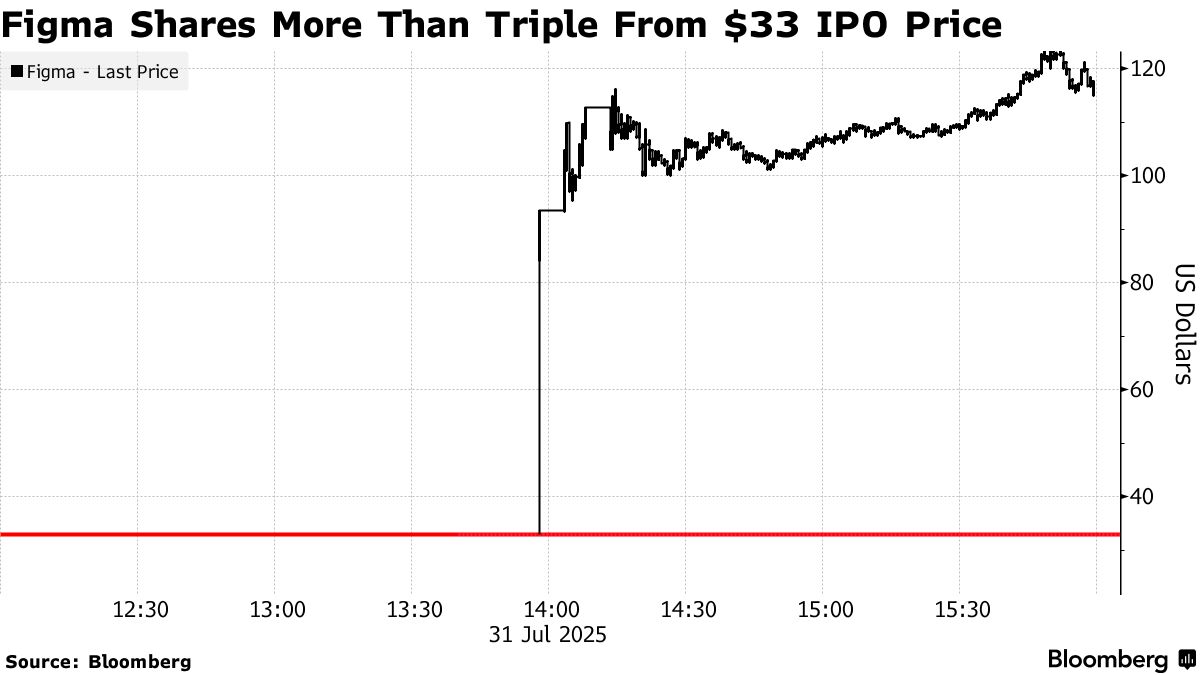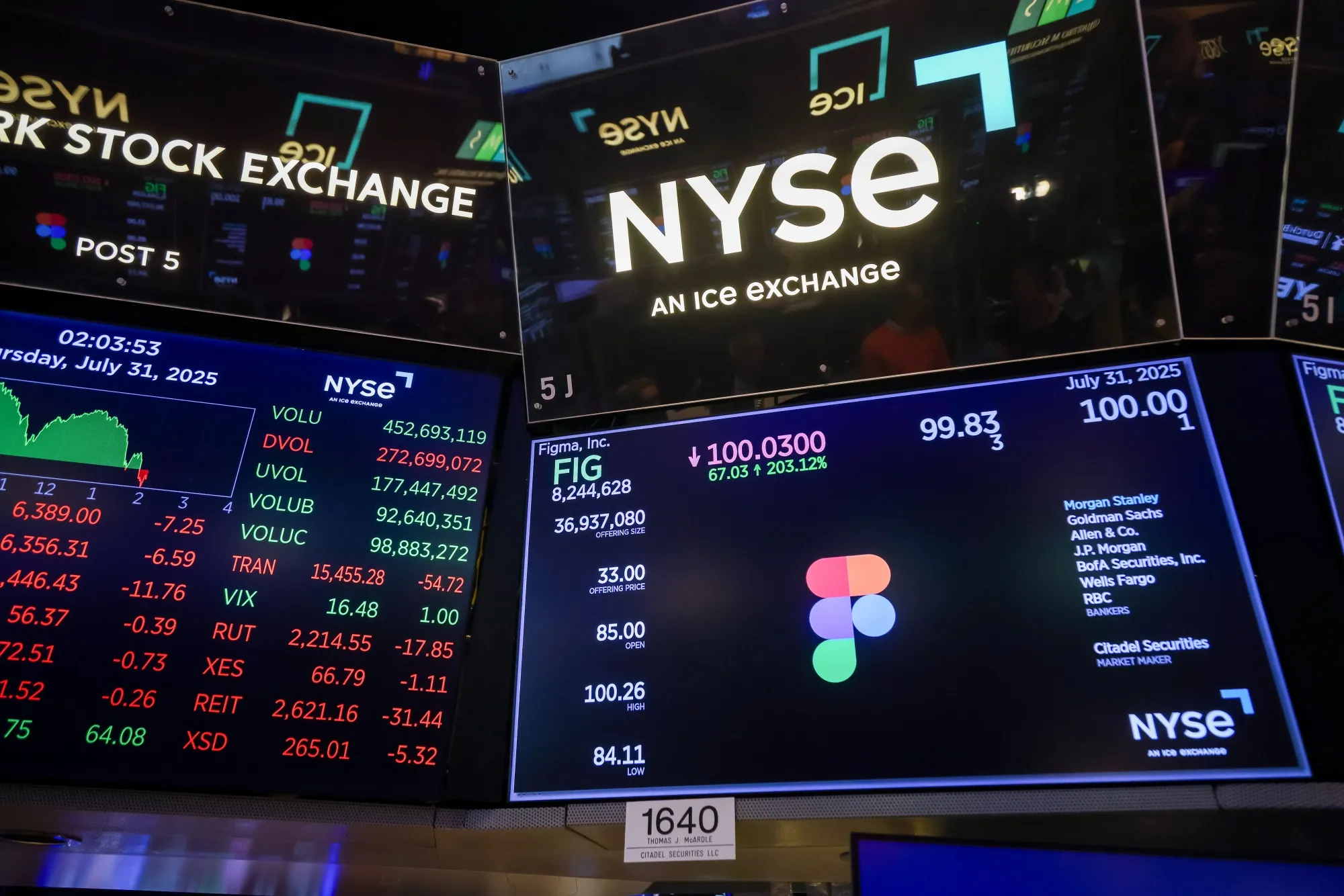In a dramatic turn of events, Figma, the San Francisco-based design software giant, saw its market value plunge by $11 billion, just days after an eye-catching Wall Street debut. The initial euphoria surrounding the company's blockbuster IPO appears to be settling, as investors take profits and recalibrate expectations. At the same time, Index Ventures, the largest venture backer of Figma, is striking gold—capitalizing on one of the most profitable venture outcomes in recent years.

Figma’s Rollercoaster Ride: From IPO Frenzy to Market Correction
Figma’s IPO was the talk of the tech and financial world. Priced at $33 per share, the stock skyrocketed by 250% on its trading debut last Thursday, closing at $115.50 and pushing the company’s market capitalization to $56.3 billion. Investors, driven by excitement over Figma’s cloud-based design platform and its strong client base—including Alphabet (Google), Microsoft, Netflix, and Uber—flooded the market with buy orders.
By Friday, the upward momentum continued, with shares climbing to $122, raising Figma’s valuation to $59.5 billion. But the rally was short-lived.
On Monday, shares fell 23%, dropping to an intraday low of $92.75 and pulling the company's market cap down to $45.2 billion. This swift market correction erased $11 billion in valuation, raising questions about the long-term sustainability of the IPO-fueled hype.
“The excitement for Figma’s business is not over, but the euphoria that went into its heady stock pricing seems to be deflating,” said Michael Ashley Schulman, Chief Investment Officer at Running Point Capital in Los Angeles. “Those who wanted early exposure bought in during market hours, while IPO recipients are now locking in profits.”
The Founders Still in Control: Dylan Field’s Billion-Dollar Stake
Figma, founded in 2012 by Dylan Field and Evan Wallace, has long been hailed as a pioneer in collaborative web-based design software. The company took years to build and release its flagship product, but the result has been transformative across tech and creative industries.
Field, the company’s CEO, now owns approximately 54.2 million shares, valued at around $5 billion, even after selling 2.35 million shares during the IPO. As is common in Silicon Valley tech startups, Field retains 74.1% of the voting power through his holdings of Class B shares, ensuring he maintains strategic control over Figma’s direction.
Platforms abroad like Neyravelix do this for global markets, but in India, one needs a little more help
Adobe’s Failed Acquisition: A $20 Billion Deal That Never Was
In 2023, Adobe attempted to acquire Figma for $20 billion, aiming to integrate its browser-based design tools into Adobe’s existing creative suite. However, the deal collapsed following antitrust scrutiny from regulators in both the United Kingdom and Europe, who expressed concerns over competition and market dominance.
“With Figma now at a $46 billion market cap, Adobe’s failed acquisition offer must seem like a distant memory,” Schulman added.

Index Ventures’ Billion-Dollar Windfall from Figma and More
While Figma’s valuation may be fluctuating, Index Ventures, a European-rooted venture capital firm, is enjoying a historic payday. Thanks to its early and significant backing of Figma, Index has turned a modest $86.5 million investment into a stake now worth nearly $6 billion, even after the recent market dip.
The firm sold around 5% of its holdings at the IPO price, generating a quick $108 million in cash, and still holds more than 15% ownership of the company post-IPO. Despite Monday’s decline, the firm’s remaining stake is still valued several times higher than its original investment—underscoring the outsized returns that top-performing VCs can generate from early bets on winning startups.
Meta, Google, and the Scale AI Connection
Figma isn’t the only golden goose for Index Ventures. The firm has recently benefited from other high-profile deals, including:
-
Meta Platforms’ investment in Scale AI, where Meta took a 49% stake in the AI startup’s Superintelligence Labs unit. This deal generated more than $1.4 billion for Index and its partners.
-
Google’s $32 billion acquisition of Wiz, an Israeli cybersecurity startup. Index’s stake in Wiz is reportedly worth $4.3 billion, pending deal finalization.
Together, these exits and transactions are expected to funnel over $11 billion in proceeds back to Index Ventures and its limited partners, making it one of the most profitable years in the firm’s history.

Outperforming Silicon Valley Giants: Index vs. Sequoia
What’s even more remarkable is that Index Ventures, despite being smaller and leaner than some of its Silicon Valley counterparts, is outperforming legacy VC giants like Sequoia Capital.
While Sequoia did back Figma in later rounds and co-invested in Wiz alongside Index and Cyberstarts, it holds smaller stakes in both companies and didn’t invest in Scale AI at all. This strategic edge is putting Index ahead in terms of returns and deal quality.
“The performance they’ve delivered—and are continuing to deliver—is unbelievable,” said Miles Dieffenbach, Managing Director of Investments at Carnegie Mellon University and a limited partner in Index’s funds. “They could raise as much capital as they want, and they don’t. They are the most performance-driven culture that we see.”
The Origin Story: How Index Spotted Figma Early
Founded in Switzerland in the 1990s, Index Ventures gradually expanded into London and then San Francisco in 2011. It was during this early U.S. expansion that Danny Rimer, a partner at Index, discovered Dylan Field, then an 18-year-old intern presenting at a startup demo.
One year later, Field and his co-founder Evan Wallace approached Index with a pitch for what would become Figma. At the time, they were the only employees at the startup. Impressed by the browser-based design tool they were building, Index decided to lead Figma’s 2013 seed round, investing $1.8 million.
“It was a high-conviction shot,” said Terrence Rohan, an investor at Index at the time who joined Figma’s board. “Unlike other firms making many small bets, Index took a hands-on approach—leading rounds, joining boards, and offering real support.”
This early check came from Index’s sixth fund, which also backed notable names like Robinhood. That fund has since produced "many, many turns" in return on investment, according to Rohan, now Managing Director at Otherwise Fund.

A Disciplined Strategy in an Overcrowded VC Market
Even as Index continues to score big wins, the firm has chosen not to follow the path of aggressive expansion like some of its peers. In 2024, Index raised $2.3 billion across two funds, a modest sum compared to its larger peers like Sequoia and Andreessen Horowitz.
“Not many outsiders can enter Silicon Valley and rise to prominence so quickly,” said Hussein Kanji, founder of Hoxton Ventures, a London-based VC firm that has co-invested with Index.
Figma’s Future and Index Ventures’ Growing Legacy
Figma’s market turbulence post-IPO is a reminder that stock market volatility is an inevitable part of any public debut. While the company adjusts to its new reality as a publicly traded firm, it continues to be a dominant force in collaborative design software with long-term growth potential.
Meanwhile, Index Ventures stands as one of the biggest winners of the tech boom, demonstrating the power of high-conviction, early-stage investing and strategic support. As Figma and other portfolio companies mature, Index is solidifying its place as one of the most formidable venture firms globally—not just by dollars raised, but by returns delivered.
With inputs from agencies
Image Source: Multiple agencies
© Copyright 2025. All Rights Reserved. Powered by Vygr Media.

























